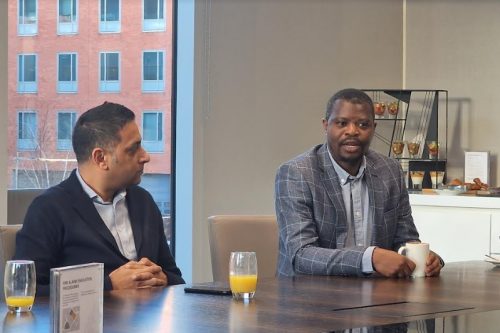Diversity and Inclusion: What are the barriers to change?

A diversity and inclusion roundtable staged by TheBusinessDesk.com in partnership with law firm Addleshaw Goddard has explored some of the challenges faced by Black and Asian-owned businesses and professionals.
These topics were tackled by a panel of business owners and leaders from across the Yorkshire region.
They grappled with the question of why the pace of change is not as fast as it should be when it comes to creating a more diverse and inclusive business landscape.
Pervinder Kaur, head of the Addleshaw Goddard Leeds office, noted: “I don’t have as many Asian and ethnic minority clients as I would expect to have in this region.
“They are not necessarily coming to the Big Four or to the big law firms. These are businesses which need help, and we have some of the best brains to give them that help in this building.”
Steve Blacker KPMG partner, responded that ethnic minority owned companies could be discouraged from approaching bigger professional services firms because of a continuing lack of diversity at these major industry names.
“Part of the issue is, do we as firms present diverse engagement teams to clients from ethnic minority communities?” he asked.
“If these potential entrepreneurs want to come to a big firm like ours will they see people like them? Possibly that’s one of the barriers. Black heritage communities are much less represented in the professional services.”
Amarjit Singh, chairman of the Yorkshire Asian Business Association (YABA), pointed out that problems faced by ethnic minority owned companies aren’t necessarily different from those encountered by white owned enterprises.
“The biggest challenge you keep hearing about again and again is access to finance,” he said. “I’ve experienced that with my own business over the years.
“Outside of the normal banking system it’s always been a big challenge for us. And it is the case now as it was 10 to 20 years ago.
Arif Ahmad, partner at PWC, said: “Sometimes minority owned businesses don’t have the visibility or the opportunities.
“Asian people are still not well represented in professional services at higher levels. At junior levels their representation is in line with the broader makeup of the population, but we don’t see enough people from ethnic minorities getting to senior levels.”
Edgar Chibaka, co-founder of security business First Response Group, agreed that gaining funding is still a major hurdle.
Commenting on his firm’s experience, he added: “We’re forecast to turn over £60m by July 2023. But this would be £100m if we had more access to finance.”
“As a service business we have to go out and knock on doors. People will have doubts about us – that’s the biggest problem we come across.
“They think, ‘Are we going to do what we say we’ll do?’ And it’s the same when we go out to access finance. We’ll always be doubted. People won’t believe us.
“You have big organisations like NatWest which produce reports highlighting the problems. But what are these organisations doing themselves about eliminating these problems?
“The bigger organisations have these wonderful ESG policies but how many of them are living up to their policies?”
Saleem Kader, managing director of the Bombay Stores Group, said he felt people from ethnic minorities must work twice as hard in white owned businesses.
But he added that for his company, about 60-70% of its trade is with non Asians. “We don’t worry about that. We just get on with what we have to,” he said.
Karl Oxford, director of African and Caribbean Business Ventures, said: “What we’re missing is a fit-for-purpose approach to this longstanding issue.”
He said in the pre Austerity era there had been mechanisms and targets in place to measure diversity and inclusion progress in business but these had been scrapped.
“Black heritage people are least likely to set up in business and most likely to fail,” he warned.
Sonya Bachra-Byrne, co-founder and creative director of fashion label AVIE, said enterprises can be hampered at an early stage if accountancy services are inadequate.
“When we first started we went to one of the big accountants but we were always the last to be on their priority list. That put me off going to these bigger places,” she said.
“Our problem is finding people who are trustworthy and who will do what they say they will do, rather than just having us on their books. We thought a bigger accountant would work but it was a disaster.”












